While the lifting of most COVID-19 restrictions has been welcomed, citizens are being urged to continue to make efforts to protect themselves against the virus, including by getting vaccinated and practicing good hygiene.
Many citizens who spoke with this newspaper supported the move to lift the restrictions, while indicating that Guyanese as a people will have to learn to live with the virus and take the necessary precautions as they go about their daily activities. At the same time, there have been numerous large gatherings since the restrictions were lifted, including a Phagwah festival at the National Stadium on Friday that saw over 1,000 people in attendance.

 Restrictions on all social gatherings were implemented two years ago to curb the rise of positive COVID-19 cases and deaths. Not only in Guyana but across the globe the measures resulted in confinement for citizens, forcing them to adapt to a new normal as they carried out day to day activities in a pandemic.
Restrictions on all social gatherings were implemented two years ago to curb the rise of positive COVID-19 cases and deaths. Not only in Guyana but across the globe the measures resulted in confinement for citizens, forcing them to adapt to a new normal as they carried out day to day activities in a pandemic.
President Irfaan Ali on Monday signed an order rolling back the COVID-19 restrictions on social activities and distancing, while also making the wearing of masks in public spaces optional.
The new guidelines, gazetted last Monday, only provide protocols for handwashing and sanitation at businesses, where employees, customers and visitors “are encouraged to wear face masks.” The same provisions also apply to places of worship.
This announcement made Guyana the first country in the Caribbean to lift measures and return to a somewhat normal way of living.
The decision came in wake of a steep decline in new COVID-19 infections and deaths over the past month. (On Saturday, the Health Ministry reported two new cases from 331 tests that were done.)
The previous COVID-19 guidelines, which were approved last month, had retained restrictions on social activities, including private parties, events at clubs, and receptions, although they appeared to be selectively enforced.
Whatever is necessary
Leader of the People National’s Congress Reform (PNCR) Aubrey Norton, while speaking to this newspaper, questioned the grounds on which the decision was made to lift the restrictions.
He pointed out that consultations to inform the decision to reopen were absent and it is unclear whether the decision was backed by scientific data. Norton said no data was released in the public to clarify the rationale behind the decision.
“I would say we have to take it [the lifting of the measures] with a pinch of salt. Every individual should do whatever is necessary to protect themselves that is wearing their mask and sanitising,” he stated.
While supporting the lifting of the measures, Alliance For Change (AFC) parliamentarian Cathy Hughes questioned whether it was too early to encourage large gatherings.
When the curfew was lifted last month several “vaccinated only events” were hosted at the Guyana National Stadium accommodating thousands of persons. The events were held in celebration of Guyana’s 52nd Republican Anniversary.
“We are of course seeing [fewer] numbers of positive cases according to what the Minister of Health is reporting. Reopening will allow our businesses to flourish now because it has been difficult for the past two years,” Hughes said in an invited comment.
At the same time, she said persons must make it in their interest to protect not only themselves but the people around them as the virus continues to linger.
From the private sector, President of the Georgetown Chamber of Commerce and Industry (GCCI) Timothy Tucker welcomed the move and he said the organisation was in support of the decision.
As over 85% of the population is inoculated with a single dose of a COVID-19 vaccine and persons moving to take their second and third jabs, he opined that these were good grounds for the move.
However, Tucker suggested that government should embark on another campaign offering the one dose Johnson and Johnson jab to increase the uptake in vaccination. Minister of Health Dr Frank Anthony last week voiced concern over continuing lag in the uptake of booster doses or third jabs.
‘Throwing away the baby with the bathwater’
Meanwhile, Hughes stated that government’s position on the mask wearing should have been much clearer.
“Wearing a face mask is not mandatory but in order to prevent the spread of Coronavirus, persons are encouraged to wear a face mask when the person is in public,” the new guidelines state.
Although the government has lifted the mask mandate, it continues to encourage persons to wear them.
“This is where they say you are throwing away the baby with the bathwater because it is not clear to the people. People would want to say I can do as I can and not wear mask and not sanitise… these positions should have clear messages. It is my personal decision to wear a mask among people I am not familiar with,” she added.
On this point, Hughes said specially crafted public information messages should have been created and placed in public domain to educate persons.
Tucker pointed out that this is not something his agency has discussed fully with members and businesses will have to decide if they will implement it or not.
He indicated that if a company is crowded it is advisable that the staff wear their masks as a level of protection.
According to him, one of their members who is contracted to another business took the decision for their employees to be masked even though the contractor has removed that requirement.
Nonetheless, he said that businesses are encouraged to provide sanitation facilities to customers to further aid with limiting the spread of the virus.
A day following the announcement of the restrictions being lifted some stores indicate to Stabroek News that they were not enforcing mask wearing and it was up to the customer to decide whether he/she wished to wear a mask while conducting business. On the contrary, a business visited by this newspaper indicated that they still require a mask to be worn in the store at all times when business is being conducted.
There also was no uniform relaxation of the restrictions by government agencies. At the Home Affairs Ministry, this newspaper was able to enter without any restriction, while at the Health Ministry, a mask and sanitisation were required.
Quotas previously prescribed to restrict numbers at casinos, betting shops, cinemas are no longer in place and the updated guidelines also make no mention of proof of vaccination requirements for entry to public buildings. The latter was a point of contention between the government and some public servants, including teachers and health workers, who objected to the requirement, calling it a de facto vaccine mandate. In some instances, some public workers had been locked out of their workplaces where they could not show proof of full vaccination or produce a negative PCR test result.
Also absent from the new guidelines is the previous restriction on visitation to quarantine or isolation facilities, prison or correctional facilities, hospitals, nursing homes, senior citizens’ homes and other care facilities.
While it was previously required that public transport operators be fully vaccinated, it is no longer a requirement under the new guidelines.





